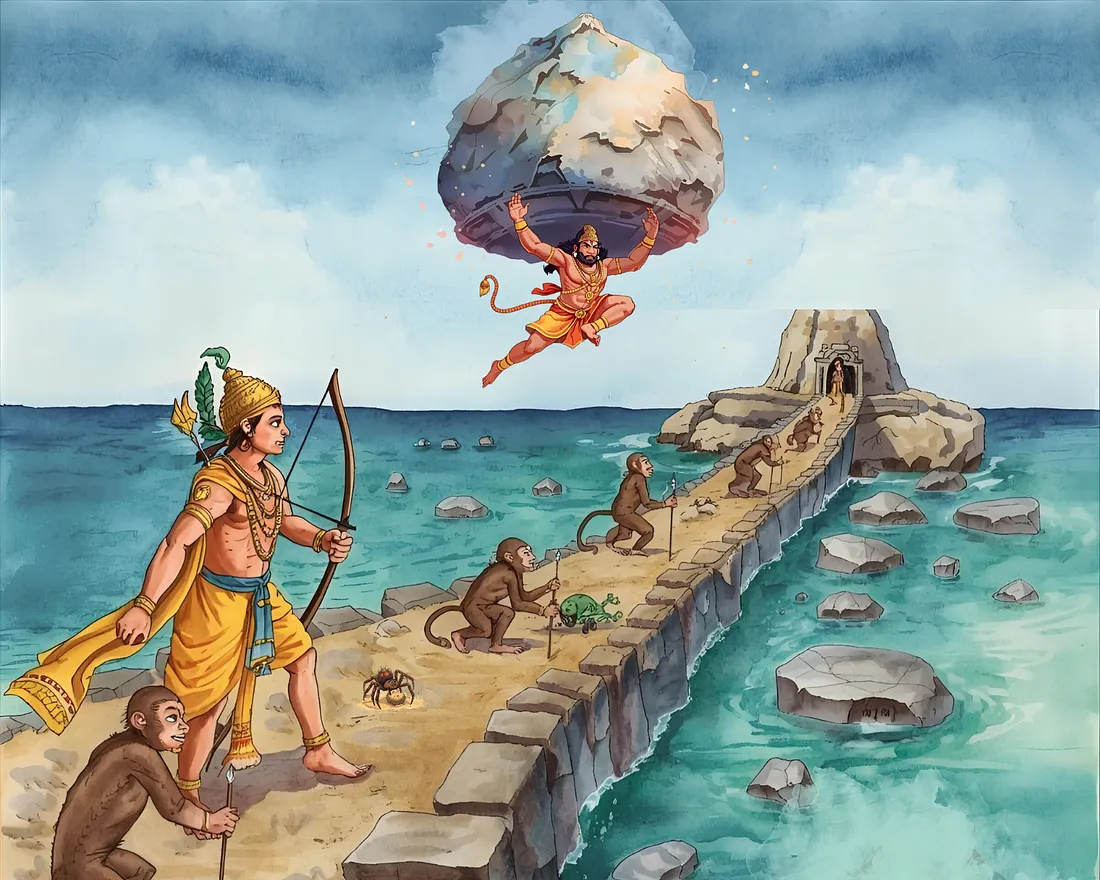 We shall read from Srimad-Bhagavatam, Canto Two, Chapter Seven: “Scheduled Incarnations.”
We shall read from Srimad-Bhagavatam, Canto Two, Chapter Seven: “Scheduled Incarnations.”
TEXT 32
gopair makhe pratihate vraja-viplavaya
deve ’bhivarsati pasun krpaya riraksuh
dhartocchilindhram iva sapta-dinani sapta-
varso mahidhram anaghaika-kare salilam
TRANSLATION
When the cowherd men of Vrndavana, under instruction of Krsna, stopped offering sacrifice to the heavenly king, Indra, the whole tract of land known as Vraja was threatened with being washed away by constant heavy rains for seven days. Lord Krsna, out of His causeless mercy upon the inhabitants of Vraja, held up the hill known as Govardhana with one hand only, although He was only seven years old. He did this to protect the animals from the onslaught of water.
PURPORT by Srila Prabhupada
Children play with an umbrella generally known as a frog’s umbrella, and Lord Krsna, when He was only seven years old, could snatch the great hill known as the Govardhana Parvata in Vrndavana and hold it for seven days continuously with one hand, just to protect the animals and the inhabitants of Vrndavana from the wrath of Indra, the heavenly king, who had been denied sacrificial offerings by the inhabitants of Vraja-bhumi.
COMMENT by Giriraj Swami
Lord Krishna was playing the part of a young boy. Here the Bhagavatam says salilam, playfully: just as a small child picks up a frog’s umbrella (a mushroom shaped like an umbrella) and plays with it, so Lord Krishna picked up Govardhana Hill and held it like an umbrella to shelter the residents of Vrindavan from the torrential rains of Indra.
PURPORT (continued)
Factually there is no need of offering sacrifices to the demigods for their services if one is engaged in the service of the Supreme Lord. Sacrifices recommended in the Vedic literature for satisfaction of the demigods are a sort of inducement to the sacrificers to realize the existence of higher authorities. The demigods are engaged by the Lord as controlling deities of material affairs, and according to the Bhagavad-gita, when a demigod is worshiped the process is accepted as the indirect method for worshiping the Supreme Lord. But when the Supreme Lord is worshiped directly there is no need of worshiping the demigods or offering them sacrifices as recommended in particular circumstances. Lord Krsna therefore advised the inhabitants of Vraja-bhumi not to offer any sacrifices to the heavenly king Indra.
COMMENT
Many of you know the story: Nanda Maharaja and the other men of Vrindavan were collecting the paraphernalia to perform the Indra-yajna, and when the child Krishna saw the men so engaged, He asked His father, “Dear father, kindly explain to Me the purpose for which you are gathering this paraphernalia. Is this ritualistic performance based on scriptural injunctions, or is it simply customary? What is to be gained by this performance?” Srila Prabhupada tells us the implication of Krishna’s inquiry: We should not engage in rituals simply because our parents or grandparents did—without any gain. Although we may have had forefathers who worshipped demigods, Lord Krishna here suggests that there is no need for us to continue such worship. Therefore, Krishna advised the residents of Vrindavan to stop the sacrifice to King Indra.
So, in principle, we should not engage in ritualistic performances without any result. There should be some positive benefit from our activities, as there is with devotional service, which, according to both the Bhagavad-gita and practical experience, is joyfully performed. Pratyaksavagamam dharmyam su-sukham kartum avyayam: “It gives direct perception of the self by realization, and it is joyfully performed.” (Gita 9.2)
The Bhagavad-gita also explains that worship offered to demigods is actually meant for Lord Krishna but is avidhi-purvakam: it is offered indirectly, improperly, to the demigods.
ye ’py anya-devata-bhakta
yajante sraddhayanvitah
te ’pi mam eva kaunteya
yajanty avidhi-purvakam
“Those who are devotees of other gods and who worship them with faith actually worship only Me, O son of Kunti, but they do so in a wrong way.” (Gita 9.23)Lord Krishna, by His own example, showed us that we need not worship the demigods.
The question may be raised that if there is no need to worship demigods, why are sacrifices to demigods recommended in the Vedas? The answer is that although there is no need to worship the demigods when we worship the Supreme Lord, the fact is that the demigods are superior to ordinary human beings. They are entrusted with the management of different affairs within the universe. So, for those without knowledge of Krishna, sacrifices to demigods are recommended so that the performers at least acknowledge their debt to and their dependence on superior authorities.
Srila Prabhupada has compared the demigods to ministers in the cabinet of a king, and Lord Krishna to the king. The ministers are actually servants of the king and are obliged to do their jobs as directed by the king. So, if we satisfy the king, we need not satisfy the demigods separately. If the king wants to grant us some favor, the ministers are obliged to execute his order. And even if we approach some minister for some favor, if the king is against it, the minister has no authority or power to grant it.
Srila Prabhupada has also given the example that if you pay your taxes to the central government, you don’t have to go separately to the various offices to bribe them. When you pay your taxes to the central government, your money is automatically distributed among the different departments of the state. You don’t have to pay each department separately, and as a tax-paying citizen you’re entitled to all benefits.
Here Lord Krishna is acting on the principles of the Bhagavad-gita, in the role of a small child. He stopped the worship of the demigod Indra and ordered that the paraphernalia be used for the worship of the cows, the brahmans, and Govardhana Hill, which is actually the Supreme Lord Krishna Himself. As revealed later in the govardhana-lila, although Krishna, playing the part of a seven-year-old boy, accompanied the Vraja-vasis around Govardhana Hill in worship, He also expanded Himself into a separate, gigantic form and declared, “I am Govardhana Mountain.” Thus, together with the people of Vraja, the original, small Krishna bowed down to this form of Govardhana Hill, who was Lord Krishna Himself.
After Lord Krishna advised the inhabitants of Vraja-bhumi not to offer any sacrifices to Indra, the heavenly king, Indra, not knowing the position of Lord Krishna in Vraja-bhumi, became angry with the inhabitants of Vraja-bhumi and tried to avenge what he considered to be their offense to him. He ordered the Samvartaka clouds, the clouds used at the time of partial devastation to inundate the universe, to flood Vrindavan. We can just imagine: here is a simple cowherd community in Vraja, and King Indra was so blinded by pride that he summoned the clouds used to inundate the universe to attack this little community of cowherds, cows, and calves.
PURPORT (continued)
But competent as the Lord was, He saved the inhabitants and animals of Vraja-bhumi by His personal energy and proved definitely that anyone directly engaged as a devotee of the Supreme Lord need not satisfy any other demigods, however great, even to the level of Brahma or Siva.
COMMENT
The Fourth Canto of Srimad-Bhagavatam states:
yatha taror mula-nisecanena
trpyanti tat-skandha-bhujopasakhah
pranopaharac ca yathendriyanam
tathaiva sarvarhanam acyutejya
“As pouring water on the root of the tree benefits the trunk, branches, twigs and leaves, and as supplying food to the stomach nourishes the senses and limbs of the body, so worshiping the Supreme Personality of Godhead through devotional service automatically satisfies the demigods, who are parts of that Supreme Personality.” (SB 4.31.14) Yet here in the govardhana-lila we find that although the Vraja-vasis worshipped the Supreme Personality of Godhead, Krishna, still the demigod Indra was not satisfied. In fact, he was most dissatisfied. Why? Because of his false pride. Govardhana Hill was being worshipped with paraphernalia meant for him. And because he was blinded by ignorance, he could not understand that the little cowherd boy Krishna was the Supreme Personality of Godhead and his eternal master. And certainly, he could not understand that Govardhana Hill was the same Supreme Personality. But demigods are not supposed to be proud—or ignorant. They are supposed to be faithful servants of Krishna. Thus, to break the false pride of Indra and bring him back to his original consciousness, Lord Krishna enacted the govardhana-lila.
The scriptures describe that for a moment Krishna thought that maybe He should just kill Indra but then decided that no, He should bestow mercy upon him, crush his false pride, and bring him back to his original position of service to Him. And so, Krishna playfully lifted up Govardhana Hill. Any of you who have visited Vrindavan know that Govardhana Hill is quite long—at least eight kilometers—no toy for an ordinary person. But it was like a toy for Lord Krishna, and He lifted it and held it over His head with the tip of His little finger. The scriptures say that Krishna wanted to prove that He could defeat the mighty power of Indra with the tip of the little finger of His left hand. That was all He needed to dispose of the king of heaven. Eventually, after seven days, Indra came to his senses and realized that he, not the Vraja-vasis, was the one who had committed the offense, and so he withdrew the Samvartaka clouds and came to Vraja-bhumi to beg for forgiveness from Lord Krishna. And then he worshipped Lord Krishna.
As part of the worship of Govardhana Hill, Lord Krishna ordered the Vraja-vasis to prepare all sorts of foodstuffs, which they did, and they offered them to Govardhana Hill, and Govardhana ate them all. Later today we’ll have the celebration in which we offer, as the Vraja-vasis did, all sorts of preparations to Govardhana Hill, and He will eat them all. But out of His kindness, He will again return them to us to honor as maha-prasada.
PURPORT (concluded)
Thus this incident definitely proved without a doubt that Lord Krsna is the Personality of Godhead and that He was so in all circumstances, as a child on the lap of His mother, as a boy seven years old, and as an old man of a hundred and twenty-five years of age. In either case He was never on the level of the ordinary man, and even in His advanced age He appeared a young boy sixteen years old. These are the particular features of the transcendental body of the Lord.
COMMENT
There are impersonalists who try by yoga or meditation to become God, but Krishna is not that kind of a god. He did not have to become God by yoga or meditation; He was always God. From His very appearance in the prison of Kamsa, when He manifested His four-armed form as Vishnu, He was God. When He was a three-month-old baby and killed the great demoness Putana, He was God. When He was a seven-year-old boy and lifted Govardhana Hill, He was God. And when He spoke the Bhagavad-gita to Arjuna, He was God. Even at that time, although by material calculation He was a great-grandfather and more than ninety years old, because His body never ages or deteriorates, He appeared like a youth of sixteen. Krishna’s body is spiritual and not subject to disease, old age, or death, as are the bodies of ordinary conditioned souls. After Krishna’s body matured to the point of appearing like a youth’s, it never grew older. That proves that Krishna had a spiritual body. We never see a picture of Krishna as an old man with gray hair and wrinkles, walking with a cane. He always looks like a handsome young man.
One more note about Krishna’s appearance and activities. We know from Krishna’s statement in the Bhagavad-gita, paritranaya sadhunam vinasaya ca duskrtam (4.8), that He appears to deliver the devotees and to annihilate the miscreants. But actually, He does not have to come personally to destroy the miscreants; He has many agents to do so. The real reason He comes is to give pleasure to His devotees, and the special feature of the govardhana-lila is that Krishna gave His association—and the greatest pleasure—to all of the residents of Vrindavan continuously for seven days. Usually the residents of Vrindavan were with Krishna for only so many hours every day. For example, in the afternoon, when Krishna would return from the pasturing grounds and enter His home and have dinner with Nanda Baba, He would give His association to Nanda and Yasoda and others in their household. And then He would take rest. But while He was taking rest at home, the cowherd boys were in separation from Him, eagerly anticipating, “Oh, when can we be with Krishna again? Oh, we have to wait until morning when we all take the cows to pasture.” So, they were in separation. And in the morning, when Krishna went into the pasturing grounds with the cowherd boys, Nanda and Yasoda and the residents of the village of Vrindavan were in separation.
The young damsels too were almost always in separation, except on special occasions when they would secretly meet Govinda at midday or in the dead of night. The young gopis could never gaze directly at Krishna except at their trysts, when they engaged in transcendental amorous pastimes.
So, the devotees were always alternating between meeting and separation. Yet for the seven days of the govardhana-lila, all the inhabitants—the servants, the friends, the elders, and even the young damsels—could be with Krishna continuously. Thus, while the govardhana-lila achieved the purpose of crushing the false pride of Indra, it also achieved the purpose of satisfying the devotees, who hankered to have Krishna’s association without cessation.
So, here is another special feature of Govardhana Hill. Because of differences in rasa, Krishna could not reciprocate openly with certain devotees in the presence of other devotees. In the govardhana-lila, however, He could reciprocate with each and every devotee no matter what relationship they had, in the presence of all the other devotees. Therefore, Govardhana Hill is very special, because Govardhana is witness to Krishna’s pastimes in all different mellows.
We can learn from this pastime that whatever onslaughts of material nature come upon us, if we take shelter of Krishna we can be protected and at the same time have all our desires for transcendental love and bliss satisfied in Krishna consciousness.
Hare Krishna.
Are there any questions or comments?
Devotee: You mentioned that Krishna comes especially for the devotees, to bestow His association upon them and give them pleasure—not for the purpose of killing the demons. So, the special demons killed by Krishna were not happy to be killed by Krishna? Can you comment?
Giriraj Swami: Krishna achieves many purposes with one action. Although His primary purpose is to please the devotees, His secondary purpose is to kill the demons, and He does both simultaneously. Actually, Krishna does not kill the demons personally; Vishnu within Krishna kills them. If His only purpose were to kill the demons, He would not appear personally. He really appears to pacify His devotees, though simultaneously He also kills demons.
Devotee: Lord Indra is such an elevated soul. How is it possible that he could not see Lord Krishna in the little seven-year-old boy? What stopped him from seeing that?
Giriraj Swami: Indra was proud, and vraja-lila is very special. In such nara-lila, humanlike pastimes, Krishna appears just like an ordinary human. Suppose, for example, if someone who held a high position in China—say, the president of China, whose face is not familiar to us—were to come here in disguise. We would not recognize him, because he would look just like everyone else. So, Krishna looked like everyone else. He looked like all the other cowherd boys; there was nothing special about Him. What distinguished Him was His potency. The head of a country is also a human being. There is nothing about his physical features that distinguishes him from others. What distinguishes him is his potency. He has the whole military under his command. He may be sitting here just like any of us, but if we order, “Declare war! Invade!” nothing will happen, and if he orders, “Declare war and invade!” it happens. That is the difference. He has potency that we do not have, but still he looks the same. Because Indra was already proud and was not really interested to know more—he just wanted to be worshipped as usual—his vision was superficial: “They are just a cowherd community, and Krishna is just a small child. He is so puffed up that he thinks he can stop my worship, and these adults are so foolish and so enamored of this boy that they follow his advice.” He thought that there was something really wrong, because that is how it looked. Therefore, sastra-caksuh: we should see the Lord through the eyes of scripture.
Devotee: Krishna came to earth to show favor to the human beings, but what about the demigods? The demigods also came to earth to participate in Krishna’s pastimes, but then we have this incident with Indra and another incident with Brahma, when they became bewildered.
Giriraj Swami: The demigods, although very powerful, can be covered by illusion just like any of us. We can be covered. We can chant Hare Krishna and feel great enthusiasm, and then later stop chanting. We are the same person, but something has happened. One day we were enthusiastically chanting and dancing, and the next day we were out in the material world. So, what happened? We got covered, and maybe puffed up. “Pride cometh before a fall.” That is what we have heard, and that is what we have experienced. Therefore Krishna mercifully displays some of His potency so that they realize His position as Supreme Lord and their own position as His eternal servants.
Sometimes when Krishna would return from the pasturing grounds with His cowherd friends, the demigods would come and shower flowers.
vatsalo vraja-gavam yad aga-dhro
vandyamana-caranah pathi vrddhaih
krtsna-go-dhanam upohya dinante
gita-venur anugedita-kirtih
“Out of great affection for the cows of Vraja, Krsna became the lifter of Govardhana Hill. At the end of the day, having rounded up all His own cows, He plays a song on His flute, while exalted demigods standing along the path worship His lotus feet and the cowherd boys accompanying Him chant His glories.” (SB 10.35.22)
So, the demigods also get to witness and worship Krishna in His pastimes. And although the cowherd boys would see the demigods worship Him, still they would not think of Krishna as God. They would think of Him as their dearest friend.
There is a difference between Krishna’s two mayas, energies—yoga-maya and maha-maya. Yoga-maya partially reveals the Lord and partially conceals Him, so the residents of Vrindavan love Krishna but are unaware that He is God. They just love Him spontaneously. In Vaikuntha the devotees love the Lord but are aware that He is God. And the conditioned souls covered by maha-maya forget that Krishna is God and sometimes forget God altogether. Their eternal love for Him is covered. Generally, demigods are also conditioned souls. Consequently, influenced by illusion, they can also forget that Krishna is God and need to be reminded.
Of course, one could say that the pastimes are there to instruct us, and they do manifest eternal principles. So, we should learn from them, become Krishna conscious, and go back home, back to Godhead, to serve Lord Krishna and His associates in love.
Sri Giri Govardhana ki jaya!
Srila Prabhupada ki jaya!
[A talk by Giriraj Swami on Govardhana-puja, October 26, 2003, Houston]




 A spiritual discourse or storytelling session centered around the teachings, life, and legacy of A. C. Bhaktivedanta Swami Prabhupada, the founder of the International Society for Krishna Consciousness (ISKCON). If you’re drawn to spiritual storytelling, devotional wisdom, or the legacy of Srila Prabhupada, this video is likely rich with heartfelt reflections and teachings. Srila Prabhupada’s
A spiritual discourse or storytelling session centered around the teachings, life, and legacy of A. C. Bhaktivedanta Swami Prabhupada, the founder of the International Society for Krishna Consciousness (ISKCON). If you’re drawn to spiritual storytelling, devotional wisdom, or the legacy of Srila Prabhupada, this video is likely rich with heartfelt reflections and teachings. Srila Prabhupada’s Translation The Emperor Svāyambhuva Manu, the son of Lord Brahmā, who is well known for his righteous acts, has his seat in Brahmāvarta and rules over the earth with its seven oceans. Purport Sometimes it is stated that Brahmāvarta is a part of Kurukṣetra or that Kurukṣetra itself is situated in Brahmāvarta, because the demigods
Translation The Emperor Svāyambhuva Manu, the son of Lord Brahmā, who is well known for his righteous acts, has his seat in Brahmāvarta and rules over the earth with its seven oceans. Purport Sometimes it is stated that Brahmāvarta is a part of Kurukṣetra or that Kurukṣetra itself is situated in Brahmāvarta, because the demigods Kartik Deep Daan Sri Dham Mayapur Day-17 #DamodarMonth Mayapur.TV Devotional engagement from the community, with over 1,000 reactions, 108 comments, and 30 shares.
Kartik Deep Daan Sri Dham Mayapur Day-17 #DamodarMonth Mayapur.TV Devotional engagement from the community, with over 1,000 reactions, 108 comments, and 30 shares. Conclusion:
Conclusion:



 At the recent national ISKCON strategic planning meetings in Melbourne (11-12 October), leaders set a goal to increase book distribution across Australia by 20% in 2025 compared to 2024. ISKCON Brisbane has already achieved this target – with more than 2 months still remaining in the year! For those unfamiliar with our book distribution mission:
At the recent national ISKCON strategic planning meetings in Melbourne (11-12 October), leaders set a goal to increase book distribution across Australia by 20% in 2025 compared to 2024. ISKCON Brisbane has already achieved this target – with more than 2 months still remaining in the year! For those unfamiliar with our book distribution mission: Who would have had the power to render ecstatic devotional service that follows in the footsteps of the damsels of Vraja? Indeed, the clever expertise of the Vraja-gopis is a prerequisite for entering the supremely sweet forest of Vrinda Devi. Enjoy the videos and music you love, upload original content, and share it all with
Who would have had the power to render ecstatic devotional service that follows in the footsteps of the damsels of Vraja? Indeed, the clever expertise of the Vraja-gopis is a prerequisite for entering the supremely sweet forest of Vrinda Devi. Enjoy the videos and music you love, upload original content, and share it all with By Mahavana Das Report on the “Purposeful Leadership” Seminar by His Grace Gauranga Darshan Das In an era when leadership is often equated with power, wealth, and visibility, His Grace Gauranga Darshan Das presented a refreshing vision at the seminar titled “Purposeful Leadership: Purpose Must Lead, Profits Shall Follow.” The event was organized by the
By Mahavana Das Report on the “Purposeful Leadership” Seminar by His Grace Gauranga Darshan Das In an era when leadership is often equated with power, wealth, and visibility, His Grace Gauranga Darshan Das presented a refreshing vision at the seminar titled “Purposeful Leadership: Purpose Must Lead, Profits Shall Follow.” The event was organized by the By Padsevan Bhakta Das The UDGAAR Mega Youth Festival 2025 saw over 15,000 young participants unite in India’s largest ever addiction awareness pledge—earning a coveted Guinness World Record. The festival, organized by ISKCON India Youth Council- North Wing (IIYC) in collaboration with Northern India Divisional Council (NIDC), and was hosted by ISKCON Greater Delhi, was
By Padsevan Bhakta Das The UDGAAR Mega Youth Festival 2025 saw over 15,000 young participants unite in India’s largest ever addiction awareness pledge—earning a coveted Guinness World Record. The festival, organized by ISKCON India Youth Council- North Wing (IIYC) in collaboration with Northern India Divisional Council (NIDC), and was hosted by ISKCON Greater Delhi, was Over the last few days, Mahārāja has been experiencing episodes of bloody sputum and increased oxygen requirement due to the presence of thick mucus plugs in the lungs, along with a few episodes of fever. With regular medications, nebulizations, and intense chest physiotherapy, the lung condition improves temporarily but tends to get congested again. To
Over the last few days, Mahārāja has been experiencing episodes of bloody sputum and increased oxygen requirement due to the presence of thick mucus plugs in the lungs, along with a few episodes of fever. With regular medications, nebulizations, and intense chest physiotherapy, the lung condition improves temporarily but tends to get congested again. To UDGAAR 2025 wasn’t just an event, it was an awakening and transformation. Now, it’s time to carry that light forward. Let’s take a pledge to stand together for Nasha Mukt Bharat! UDGAAR 2025 Highlights | The Festival Of Culture & Wellness | 12th October | IGI Stadium, Delhi
UDGAAR 2025 wasn’t just an event, it was an awakening and transformation. Now, it’s time to carry that light forward. Let’s take a pledge to stand together for Nasha Mukt Bharat! UDGAAR 2025 Highlights | The Festival Of Culture & Wellness | 12th October | IGI Stadium, Delhi Kartik Deep Daan Sri Dham Mayapur Day-15 #DamodarMonth Mayapur.TV
Kartik Deep Daan Sri Dham Mayapur Day-15 #DamodarMonth Mayapur.TV We are waiting for the results of our National Strategic Planning workshop from the weekend before last. We spent two very productive days with most of the members of the ISKCON Australia National Council working on a broad strategic plan and on the Sunday focused on a Communications and Marketing plan. It was a lot
We are waiting for the results of our National Strategic Planning workshop from the weekend before last. We spent two very productive days with most of the members of the ISKCON Australia National Council working on a broad strategic plan and on the Sunday focused on a Communications and Marketing plan. It was a lot Iskcon Vrindavan – Goverdhan Puja 2025 – Sringar Darshan Iskcon vrindavan added photos to the album: Goverdhan Puja 2025 – Sringar Darshan Iskcon vrindavan
Iskcon Vrindavan – Goverdhan Puja 2025 – Sringar Darshan Iskcon vrindavan added photos to the album: Goverdhan Puja 2025 – Sringar Darshan Iskcon vrindavan Iskcon Seattle-Govardhan Puja(October 21st 2025) Darshan pictures Govardhan Puja(October 21st 2025) Darshan pictures Iskcon Seattle
Iskcon Seattle-Govardhan Puja(October 21st 2025) Darshan pictures Govardhan Puja(October 21st 2025) Darshan pictures Iskcon Seattle We shall read from Srimad-Bhagavatam, Canto Two, Chapter Seven: “Scheduled Incarnations.”
We shall read from Srimad-Bhagavatam, Canto Two, Chapter Seven: “Scheduled Incarnations.” Here is another explanation of the bewilderment created by the pastimes of the Supreme Lord. The Supreme Lord is the Supreme in all circumstances, as already explained. Here is a specific example of the Lord’s being the Supreme and at the same time a plaything in the presence of His pure devotee. The Lord’s pure
Here is another explanation of the bewilderment created by the pastimes of the Supreme Lord. The Supreme Lord is the Supreme in all circumstances, as already explained. Here is a specific example of the Lord’s being the Supreme and at the same time a plaything in the presence of His pure devotee. The Lord’s pure By Indradyumna Swami
By Indradyumna Swami  We wish you all a happy Diwali. Diwali, or Dipavali, marks the end of the year, and by the year’s end we want to pay our debts and rectify our relationships—and then try to do better the next year.
We wish you all a happy Diwali. Diwali, or Dipavali, marks the end of the year, and by the year’s end we want to pay our debts and rectify our relationships—and then try to do better the next year.


 By Vanamala dd
By Vanamala dd By Iskcon Vrindavan
By Iskcon Vrindavan By Sulalita Devi Dasi
By Sulalita Devi Dasi Guru Prasad Swami’s early contribution in ISKCON Costa Rica centered on administrative services and distributing BBT publications beginning in 1975 in the USA and from 1976-1978 in Central America. He became the temple president of Costa Rica temple in 1978, and then began traveling around Latin America, opening new temples, establishing worship centers and collaborating
Guru Prasad Swami’s early contribution in ISKCON Costa Rica centered on administrative services and distributing BBT publications beginning in 1975 in the USA and from 1976-1978 in Central America. He became the temple president of Costa Rica temple in 1978, and then began traveling around Latin America, opening new temples, establishing worship centers and collaborating By ascribing to himself the degraded status of a demoniac birth, Bali Mahārāja denied any spiritual qualification for being visited by Kṛṣṇa and Balarāma. What to speak of demons like himself, Bali thought, even advanced renunciants on the paths of jñāna and yoga fail to please the Lord when they do not give up their
By ascribing to himself the degraded status of a demoniac birth, Bali Mahārāja denied any spiritual qualification for being visited by Kṛṣṇa and Balarāma. What to speak of demons like himself, Bali thought, even advanced renunciants on the paths of jñāna and yoga fail to please the Lord when they do not give up their In this verse, King Bali offers heartfelt obeisances to Lord Krishna, recognizing Him as: Ananta – the unlimited and infinite Lord Bṛhat – the greatest of all beings Vedhase – the creator of the universe Disseminator of Sāṅkhya and Yoga – the source of spiritual knowledge and mystic practices Brahman and Paramātmā – the Absolute
In this verse, King Bali offers heartfelt obeisances to Lord Krishna, recognizing Him as: Ananta – the unlimited and infinite Lord Bṛhat – the greatest of all beings Vedhase – the creator of the universe Disseminator of Sāṅkhya and Yoga – the source of spiritual knowledge and mystic practices Brahman and Paramātmā – the Absolute Where do you take shelter when life moves in such a way that you can’t manage it? Is it within your money? Is it with some friends? Or is it some telephone service where you ask for advice — some coaching firm? Where do you take shelter? In Vrindavan, we learn to take exclusive shelter
Where do you take shelter when life moves in such a way that you can’t manage it? Is it within your money? Is it with some friends? Or is it some telephone service where you ask for advice — some coaching firm? Where do you take shelter? In Vrindavan, we learn to take exclusive shelter





 By Aseem Krishna Das A grand Sri Sri Krishna Balaram Shobha Yatra Festival was organized in the Karnal district of Haryana from 10th September to 5th October 2025. This year, the Shobha Yatra was held at three different locations across Karnal. The local congregation was fully engaged and absorbed throughout the entire month-long festival, spreading
By Aseem Krishna Das A grand Sri Sri Krishna Balaram Shobha Yatra Festival was organized in the Karnal district of Haryana from 10th September to 5th October 2025. This year, the Shobha Yatra was held at three different locations across Karnal. The local congregation was fully engaged and absorbed throughout the entire month-long festival, spreading The video features a lecture by HH Prahlādānanda Swami on Śrīmad-Bhāgavatam Canto 4, Chapter 12, Verses 1–3. The central theme revolves around the nature of time (kāla) as an aspect of the Supreme Lord and its role in creation and destruction. The Swami explains that all events—including death, anger, and even warfare—are ultimately orchestrated by
The video features a lecture by HH Prahlādānanda Swami on Śrīmad-Bhāgavatam Canto 4, Chapter 12, Verses 1–3. The central theme revolves around the nature of time (kāla) as an aspect of the Supreme Lord and its role in creation and destruction. The Swami explains that all events—including death, anger, and even warfare—are ultimately orchestrated by Krishna will never rob the soul of its autonomy, love must be given not taken. This class was given by His Grace Mahatma Prabhu on October 12, 2025 from Alachua, Florida. Krishna Is Not Just Controlled by Love, He Is Owned by Love! | Sunday Feast Class | Mahatma Das
Krishna will never rob the soul of its autonomy, love must be given not taken. This class was given by His Grace Mahatma Prabhu on October 12, 2025 from Alachua, Florida. Krishna Is Not Just Controlled by Love, He Is Owned by Love! | Sunday Feast Class | Mahatma Das